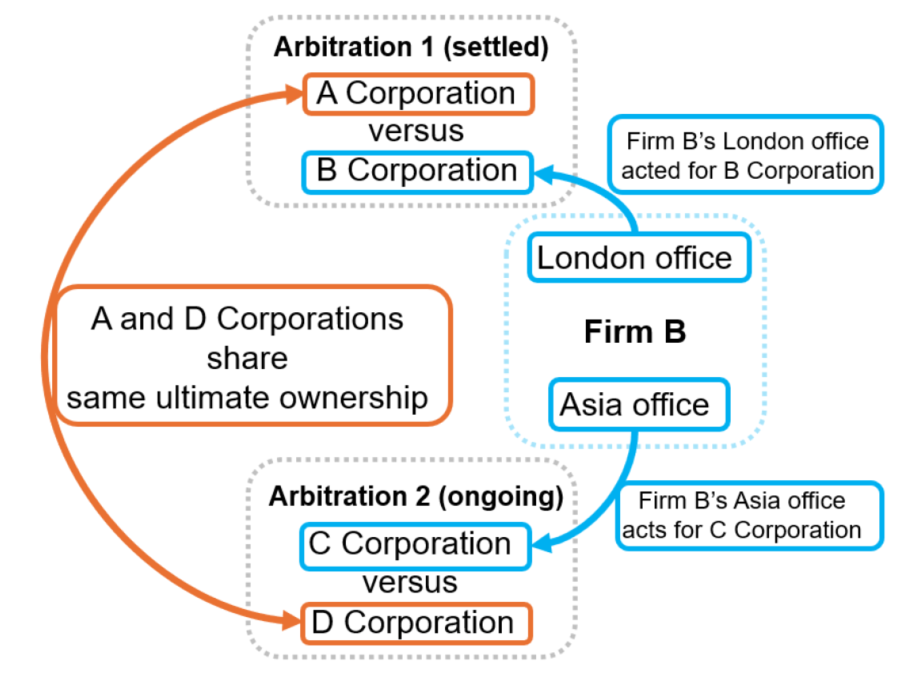The High Court handed down an important judgment on 8 May 2025 concerning arbitral confidentiality. The judgment should be of particular interest to law firms acting for clients in multiple, related cases.
Background
The visual below sets out the parties and the relationships between them:

Firm B acted on two arbitrations – Arbitration 1 and Arbitration 2. Firm B acted for B Corporation in Arbitration 1 and C Corporation in Arbitration 2.
A Corporation was a party to Arbitration 1. D Corporation was a party to Arbitration 2. A Corporation and D Corporation shared the same ultimate ownership, which was a source of A Corporation’s perceived interest in Arbitration 2.
The relief sought
A Corporation sought an interim injunction against the Defendants (Firm B and one of its partners, Mr W), requiring:
(1) Firm B to cease acting for C Corporation in Arbitration 2;
(2) Firm B to utilise a partner with no prior involvement to “cleanse” files containing “any confidential information” in Arbitration 2;
(3) Firm B to refrain from providing confidential information to C Corporation and their representatives involving in Arbitration 2; and
(4) Mr W, a partner at Firm B’s London office, to deliver a sworn affidavit, detailing confidential
information in Arbitration 1 which had already been provided to Firm B’s Asia office, C
Corporation and others.
Analysis
Mr Justice Foxton’s principal focus was on the implied obligation of confidentiality in respect of arbitrations arising under English law. The Court considered the following critical questions in determining the application:
(1) what material does the obligation of arbitral confidentiality extend to; and
(2) to the extent that the obligation of arbitral confidentiality is engaged, what are the relevant exceptions?
What documentation and information are covered by the obligation of arbitral confidentiality?
Materials caught by the obligation of arbitral confidentiality are:
(1) categories of documents and/or information that arise from the private nature of an arbitral process (due to the fact and manner in which such documentation is adopted in the arbitration). This catches:
(a) the arbitration hearing(s), including transcripts or notes of the hearing;
(b) documents disclosed between the parties during arbitration;
(c) documents generated or prepared for and subsequently used in an arbitration such as pleadings (e.g. statement of case, particulars of claim), witness statements, expert reports, written submissions and correspondence between the parties within the arbitration context; and
(d) the arbitral award.
(2) Any information derived from any documents in point (a) above which themselves constitute confidential information.
However, there is a sliding scale of arbitral confidentiality and not all materials covered by arbitral confidentiality will justify the same level of protection from the courts. For instance, disclosing one’s own reports may be less intrusive than disclosure of material produced by the other party. Further, the Court observed that the line between protected information and “experience” which lawyers inevitably acquire from conducting arbitration is not always easy to articulate though the latter is not “off limits” for use in subsequent proceedings. The Court gave the following as examples of the type of experience that will not be protected by a duty of confidentiality:
(1) knowledge about the type of documents generally available in relation to particular types of
issues;
(2) how major players and repeat litigators in the field structure their businesses or record-assembly and keeping;
(3) the litigation strategies of particular opponents and their approach to contested issues;
(4) which document requests have and have not yielded results; and
(5) the outlook of particular arbitrators to on issues such as the construction of contracts, readiness to find dishonesty, disclosure, amendments and security for costs.
What are the exceptions to arbitral confidentiality?
While the Court did not consider it necessary to comprehensively review all exceptions to arbitral confidentiality, it observed a number of exceptions, including:
(1) The fact that a commercial dispute leads to the commencement of an arbitration does not of itself make the existence of the dispute and the events which gave rise to it confidential. For example, if a buyer purchases goods that it later considers defective, the fact that the buyer considers the goods to have been defective does not become confidential when the buyer later commences an arbitration against the seller.
(2) A party’s own documents that come into existence independently of the arbitration are not subject to arbitral confidentiality.
(3) Where it is reasonably necessary to protect the legitimate interests of an arbitrating party, including for the purpose of making claims against or defending claims by a third party.
(4) It is permissible for the dissemination (rather than “publication”) of certain information for the purpose of advancing a party’s case in an arbitration. For example, disclosing material to lawyers, factual witnesses and experts in an arbitration context.
(5) The judge considered it strongly arguable that it is permissible to use at least some confidential material to elicit similar fact evidence from a third party who is believed to have similar complaints against the opposing party.
The Ruling
The Court dismissed A Corporation’s application in its entirety and ruled:
(1) There was no breach of confidentiality as the alleged information either fell outside of confidentiality duty or was an exception to that duty.
(2) There was no realistic possibility of a future breach based on actions already taken by Firm B.
(3) It was neither just nor equitable to prevent Firm B from acting for D Corporation by granting an injunction as sought by A Corporation.
Comment
The judgment provides practical guidance and examples on the scope and exceptions of confidentiality obligations in arbitration under English law. The Court also clarified the test to which law firms will be subject when acting for multiple clients in related arbitrations. Generally, materials and information relating to an arbitral process and confidential information derived from the arbitral process are confidential. However, certain general knowledge and experience gained in the course of an arbitration are not considered confidential and may therefore be applied in future engagements.

/Passle/5f3d6e345354880e28b1fb63/MediaLibrary/Images/2025-09-29-13-48-10-128-68da8e1af6347a2c4b96de4e.png)
/Passle/5f3d6e345354880e28b1fb63/MediaLibrary/Images/2025-07-10-13-52-35-189-686fc5a39f23a993118ba1a0.png)
/Passle/5f3d6e345354880e28b1fb63/SearchServiceImages/2026-02-20-09-54-03-745-69982f3bff07facd13d88f69.jpg)
/Passle/5f3d6e345354880e28b1fb63/SearchServiceImages/2026-02-18-09-25-14-317-6995857a406a38553e720e5d.jpg)